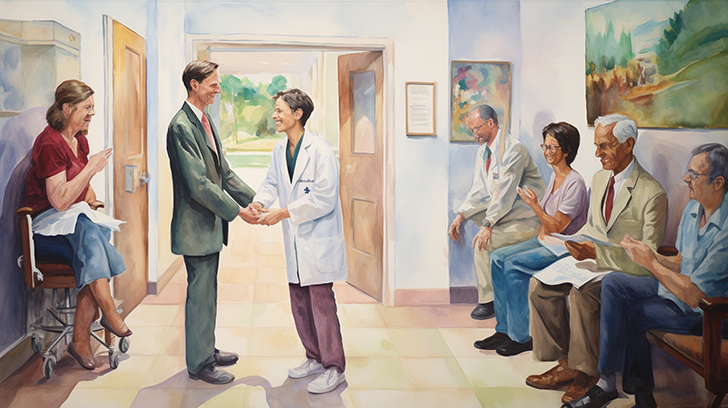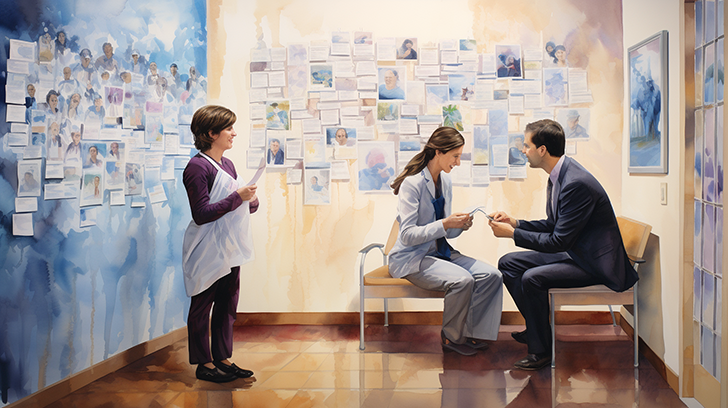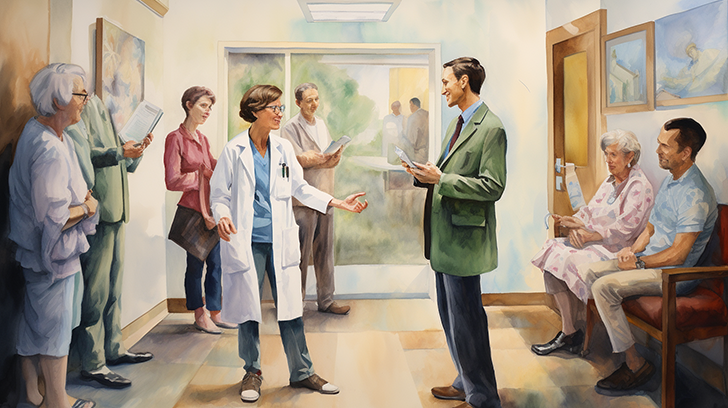- by Tim Thompson
NHS Organ Donation and transplant
Organ donation is a process by which a person can donate their organs and tissues for transplantation after their death. Joining the NHS organ donor is an act of altruism and compassion that has the potential to save and improve the lives of others.
Understanding Organ Donation
What is Organ Donation, and how does it involve types of cancers to donate?
Organ donation involves the removal of organs or tissues from a donor’s body, which are then transplanted into the body of a recipient to restore function or save their life. This selfless act can extend the life of another individual who needs a transplant.
NHS Organ Donation and transplant Consent Forms
Types of Donations on the NHS Organ Donor’s Consent Form.
If you live in the UK and have talked to your loved ones about it, there are two primary types of organ donation: living donation and deceased donation. Living donation involves donating a kidney, liver segment, or other tissues while the donor is alive. Deceased donation occurs after the donor, possibly a cancer survivor, has passed away, and their organs and tissues are used for transplantation or sent as tissue to a medical school.
Accepting Bodies and the Importance of Organ Donation in Medical Schools
Organ donation plays a vital role in addressing the shortage of organs available for transplantation. It provides hope to individuals suffering from organ failure and can significantly enhance the quality of life for recipients.
Becoming an Organ Donor
If you are considering how to make your wishes known to donate after death as an Organ and Tissue Donor, registration is key.
To become an organ donor, individuals can register their decision to donate their organs and tissues after their death through the NHS Organ Donor Register, especially adults in England as there is a minimum age for donation. By doing so, they express their willingness to contribute to the noble cause of saving lives through organ donation.
Deciding to donate means it’s vital to talk to your loved ones about your decision. Your intention to donate and your registration process should be discussed openly.
The decision to become an organ donor and choose to donate, even after being diagnosed with one of the types of cancers to donate, is a personal choice. It involves an individual’s willingness to offer the gift of life to others, even after their own passing. Your decision to donate holds significant ethical and emotional weight. It’s crucial to include your loved ones in the conversation and understand your decision will be valued by staff and students alike.
Discussion with Family Members
It is crucial for individuals who wish to donate their organs to have open and honest discussions with their close family members regarding their decision. These conversations, along with making their wishes known in writing, can help ensure that their wishes are respected and understood by loved ones.
Legal Aspects of Organ Donation
Role of Human Tissue Authority
The Human Tissue Authority (HTA), available 24 hours a day, plays a pivotal role in regulating and overseeing the donation, storage, and use of human tissues and organs across the UK. Always be sure to talk to your loved ones when declaring your intention to donate your organs. Keep in mind that adults in England are considered potential donors unless they opt out. It ensures that the process of organ donation, including accepting bodies from individuals who had specific types of cancers and are able to donate after three years, and transplantation adheres to legal and ethical standards.
Opt-out System for Organ Donation
In England, an opt-out system for organ donation is in place, whereby individuals are presumed to consent to organ donation unless they explicitly opt-out or their family will always be asked for confirmation. The aim is to increase the number of tissue donors and reduce the organ shortage.
Please register your Consent and Authorization for Organ Donation.
Consent for organ donation can be provided in various ways, including registering on the NHS Organ Donor Register, carrying a donor card, or communicating one’s wishes to family members. Your registration process is essential to ensure that the individual’s desires regarding organ donation are honoured after their passing. This includes your conversations with your loved ones about your decision.
Organ Donation Process
Organ and tissue for research Retrieval Process.
The organ retrieval process involves the careful removal of organs and tissues from the donor’s body who has decided to donate their body to science. The procedure of accepting a body for organ retrieval is handled by healthcare professionals trained in organ donation, ensuring that donation will become an important part of the medical practice. These organs, including those from donors with cancers to donate after three years, are then preserved and transported to the recipients for transplantation.
Transplant Procedure, where organ donation is possible, is a significant part of the process.
The transplant procedure entails surgically implanting the donated organ or tissue into the recipient’s body. This complex procedure requires skilled medical professionals and meticulous attention to ensure the success of the transplant and the well-being of the recipient. In this context, it may be possible for people with certain medical conditions to receive a transplant.
Aftercare and Follow-up
Following a transplant, recipients require comprehensive aftercare and ongoing medical monitoring to assess the functionality of the transplanted organ or tissue and manage any potential complications. This support is integral to the recipient’s recovery and long-term well-being.
Donation After Death to Science
Body Donation to Medical Science
Body donation to medical science involves individuals bequeathing their bodies to academic and research institutions for educational and scientific purposes; some may choose to donate both organs and tissues. It contributes to the advancement of medical knowledge and the training of future healthcare professionals, making it possible for people with certain health conditions to have a new lease on life.
Wanting to donate your organs and tissues can serve Research and Medical Education Purposes.
Donated bodies are utilized for research, anatomical study, surgical training, and medical education, serving as invaluable resources for healthcare institutions and aspiring medical professionals seeking to deepen their understanding of human anatomy and pathology.
Benefits and Considerations of Body Donation
Body donation confers benefits such as supporting medical research, advancing healthcare education, and contributing to the development of innovative medical treatments. Individuals considering body donation should carefully weigh the considerations and potential impact of their decision.
Impact of Organ Donation
Organ donations are highly valued by staff as they contribute to saving lives through organ donation.
Organ donation has a profound impact on the lives of recipients, as it can save them from debilitating conditions, prolong their life expectancy, and enhance their overall quality of life. The act of donation carries the potential to bring hope and healing to individuals in need.
Ethical, Moral, and Medical Implications of Organ Donation towards Medical Schools have always been valued by staff and students alike.
Organ and tissue donation raises ethical and moral considerations related to consent, autonomy, and the allocation of organs. Engaging in thoughtful dialogue and ethical reflection can help individuals navigate the complexities surrounding organ donation decisions.
Public Awareness and Advocacy for Organ Donation
Raising public awareness about organ donation, educating people about the possibility of donating despite being victims of types of cancers, and advocating for its importance can foster a culture of generosity and compassion in the UK. Educating the public about the impact of organ and tissue donation can inspire more individuals to consider becoming donors and contribute to the well-being of others.
Registering your decision on whether or not to donate your organs and tissue
How to donate your body to science
1. Research and Decision-Making
- Understand the Contribution: Body donation in the UK supports medical education, training, and research, helping to advance medical science and healthcare.
- Legal Framework: The Human Tissue Authority (HTA) regulates body donations in the UK under the Human Tissue Act 2004.
2. Finding a Medical School
- Select a Medical School: In the UK, most medical schools accept body donations for research and teaching. A list of medical schools and their contact details can be found on the HTA website.
- Local Preferences: It’s advisable to choose a medical school near your place of residence to minimize transportation costs, as not all schools can cover these expenses.
3. Contacting the Institution
- Request Information: Contact the medical school’s body donation coordinator to request information about their specific donation process.
- Forms and Documents: You will be provided with consent forms and detailed instructions on how to complete the donation process.
4. Completing the Consent Process
- Informed Consent: The donor must give written consent during their lifetime. Consent cannot be given by next-of-kin after the donor’s death.
- Witness Requirement: The consent form typically needs to be signed in the presence of a witness.
- Copy to Next-of-Kin: It’s recommended to inform your next-of-kin or executor of your wishes and provide them with a copy of the consent form.
5. At the Time of Passing
- Immediate Notification: Your next-of-kin or executor should contact the medical school as soon as possible after your passing.
- Acceptance of Donation: Acceptance is subject to the medical school’s current requirements and the condition of the body at the time of death.
6. After Donation
- Use of the Body: Bodies are usually used for a period of up to three years, after which they are typically cremated, though some schools may offer the option for burial.
- Memorial Services: Many institutions hold annual memorial services to honour the contributions of body donors.
7. Alternative Arrangements
- Plan B: If your body is not accepted (due to medical reasons, capacity, or other factors), ensure your next-of-kin or executor knows your alternative funeral wishes.
Which Organs and Tissue Can Be Transplanted?
Organs and tissues that can be transplanted include the heart, kidneys, liver, lungs, pancreas, intestines, corneas, skin, bone, and bone marrow. These transplants can save and improve the lives of those in need.
What Happens After Body Donation?
After deciding that you want to donate your organs or brain or tissue, post-body donation, your organs and/or tissues may be retrieved for transplantation, tissue for research or medical research. In the case of organ and tissue for research donation, if you want to donate some organs, they are carefully removed and preserved before being transplanted into recipients or sent to research establishments.
For body donation to medical science, the body is utilized for educational and scientific purposes, contributing to the advancement of medical knowledge and the training of future healthcare professionals.
Organ Donation in England
If you are among adults in England and want to donate your organs, remember organ donation operates under an opt-out system, where individuals are presumed to consent to donation unless they explicitly opt out. This aims to increase the number of potential donors, including those with certain types of cancers who can donate after three years, and reduce the shortage of organs for transplant.
The Human Tissue Authority’s Role
The Human Tissue Authority (HTA) plays a pivotal role in regulating and overseeing the donation, storage, and use of human tissues and organs across the UK. It ensures that the process of organ donation and transplantation adheres to legal and ethical standards.
Donating Organs or Body Parts for Transplant
Donating organs or body parts for transplant involves registering on the NHS Organ Donor Register, carrying a donor card, or communicating one’s wishes to family members. Becoming a tissue donor is a selfless act that can extend and improve others’ lives and health; it’s possible to donate both tissues and organs.
What Organs Can Be Donated After Death?
Organs that can be donated after death include the heart, lungs, liver, pancreas, and kidneys. Additionally, tissues like corneas, skin, bone, and bone marrow can also be donated to help those in need of transplantation.
How Soon Can Organs Be Donated After Death?
Organs intended for transplantation should be retrieved as soon as possible after death to maintain their viability. Clinicians will never proceed without proper authorisation, always striving to honour the donor’s wishes. Efficient communication and coordination by a specialist nurse are essential to ensure timely retrieval, preservation, and transportation of organs for transplantation.
What Is the Biggest Problem for Organ Donation?
Increasing the number of people who want to donate is critical to overcome the shortage in available organs for transplantation, one of the most significant challenges in organ and tissue donation. Increasing awareness, promoting open dialogue, and addressing misconceptions can help alleviate this issue.
Who Can Donate Body to Medical Science?
Any individual, excluding certain groups, who wants to donate to medical science and education can make the decision to donate their body after death. Donations like these are highly valued by staff and students alike. It is a generous decision that supports research, anatomical study, and the training of future healthcare professionals.
How Do I Leave My Body to Medical Science?
To leave your body to medical science, you can contact academic and research institutions to understand their specific requirements and procedures for body donation. Ensuring clear documentation and communication of your wishes is crucial.
How Long Do Your Organs Still Function After Death?
After death, the viability of organs varies. At the time of donation, prompt retrieval and preservation are vital to maximize the donated organ’s functionality for transplantation. Different organs have different lifespans outside the body.
How Long Is Tissue Viable After Death?
The viability of tissues after death may change if the individual died in a hospital, depending on factors such as preservation methods and storage conditions. Proper handling and the signing of deemed consent can extend the organ, brain or tissue donation’s viability for transplantation, tissue for research or medical research purposes.
What Organs Can Only Be Donated After Death?
Organs such as the heart, lungs, liver, and pancreas are typically donated after death due to the complexity of the retrieval process. If you want to donate your organs, note that these organs need immediate preservation and transplantation for optimum success, a decision often made at the time of donation.
Which Human Organs Cannot Be Donated?
Be aware that some organs, such as the brain and spinal cord, cannot be donated for transplantation due to their critical role in neurological functions, no matter how much you want to donate your organs. However, these organs can be invaluable for medical research and study purposes when organ donation after death takes place.
What Are the 4 Types of Organ Donation?
The four types of organ donation include living donation, deceased donation, directed donation (where the organ is designated to a specific recipient), and paired donation (where a compatible pair of donors and recipients is matched for exchange).
Can I donate to every hospital?
The ability to donate organs and tissues after death is not dependent on the specific hospital where an individual passes away, but rather on the established procedures for organ retrieval and transplantation within the healthcare system.
Can you become an organ donor if you have a tattoo?
Having a tattoo does not disqualify an individual from becoming an organ donor. The presence of a tattoo does not impact the eligibility or suitability of one’s organs and tissues for donation.
Can you become an organ donor if you drink alcohol?
Alcohol consumption does not preclude an individual from becoming an organ donor. The decision not to donate organs and tissues is based on a comprehensive review of your medical and lifestyle history and is not solely influenced by alcohol consumption, particularly if you want to donate your organs.
Can you become an organ donor if you have had cancer?
The eligibility to become an organ donor after having one of the types of cancers to donate is determined on a case-by-case basis, with some organs possibly being suitable for transplant. Certain types of cancer may not prevent becoming a tissue donor, provided three years of treatment have passed and the disease is under control. Others, however, may impact the decision on the NHS organ donation’s suitability.
Can you become an organ donor if you smoke?
Smoking does not inherently disqualify an individual from becoming an organ donor. If you want to donate your organs, the decision to donate is evaluated based on your medical suitability and the condition of your organs.
Does race, or ethnicity matter in organ donation?
Race and ethnicity do not dictate an individual’s ability to donate organs and tissues. If you want to donate your organs, note that organ donation, even from individuals with certain types of cancers who can donate after three years, is based on medical criteria and matching the organs with recipients based on compatibility and need.
How is consent for organ donation established?
Consent for organ and tissue donation can be established through various means, including registering in the NHS Organ Donor Register, carrying a donor card, and expressing the wish to donate your organs to family members.
If I donate my body, will there be a funeral or memorial service?
The decision to donate one’s body to science does not preclude the possibility of a funeral or memorial service. Family members can still arrange for a service to honour the deceased individual who chose to donate or are in one.
Is carrying an organ donor card a form of consent?
Carrying an organ donor card signifies an individual’s willingness to donate their organs and tissues, but it is not considered legally binding consent. For a more effective approach, please register your intent to donate. Your registration process can serve as an indicator of your intentions regarding organ donation. It is crucial to talk to your loved ones if you want to donate your organs.
Is there an age limit for becoming an organ donor?
Remember, there is no strict age limit if you want to donate your organs. However, the minimum age for donation is 17. Before you decide that you want to donate your organs, understand that the suitability for organ donation is assessed based on the overall health and the condition of the organs and tissues at the time of death.
Is there an age limit to tissue donation?
There is no definitive age limit for tissue donation, though certain groups may be excluded depending on their health conditions. However, always be asked to support all donations, as they are highly valued. The suitability for tissue donation to a medical school or research establishment is determined based on the quality and condition of the tissues, rather than a specific age threshold.
Should I include organ donation in my will?
While including organ donation in a will can serve as an additional expression of one’s wishes, the legal validity of donation is typically established through registration on the NHS Organ Donor Register or other formal consent processes.
Who can become an organ donor?
Any individual who wishes to contribute to the noble cause of organ donation can become a donor, provided they meet the medical criteria for donation and have expressed their consent through official channels.
Which organs and tissue can be transplanted?
Organs and tissues that can be transplanted include the heart, kidneys, liver, lungs, pancreas, intestines, corneas, skin, bone, and bone marrow, offering the potential to save and improve lives.
Will the donated tissues be used immediately?
The utilisation of donated tissues depends on the specific needs of recipients and the matching of suitable donors. Not all donated tissues are used immediately, including from individuals with specific types of cancers where they can donate after three years or if they belong to one of the excluded groups. These donations are highly valued and are preserved for transplantation when needed.
When individuals generously decide to donate their bodies to science, they provide an invaluable gift to medical research and education. Medical schools and research institutions usually arrange for donated bodies to be utilized for the advancement of science, and this act of donation is considered a profound contribution. Once studies and training are completed, these establishments often arrange for the donated bodies to be cremated, although sometimes there is the option for a private burial or cremation if the family prefers and pre-arrangements have been made.
The donation of a body to a research establishment is a valuable contribution to the scientific community. Bodies become an important resource for training healthcare professionals, allowing students to gain hands-on experience that is critical to their education. Through these donations, future doctors, nurses, and other medical practitioners learn about human anatomy in a way that cannot be replicated by textbooks or models.
This practice also extends to research, where donated bodies can lead to breakthroughs in medical procedures and techniques. These contributions are an important resource for training healthcare professionals and fostering innovation in medical treatment and understanding. The knowledge gained from these donations not only enhances the skills of healthcare professionals but can also lead to improved patient care outcomes.
Each donated body is treated with the utmost respect and gratitude, recognizing that such a donation is a significant and personal decision. Whether used in teaching settings or for research purposes, the contribution of donated bodies to medical science is immeasurable, and the individuals who donate their bodies are remembered and honoured for their invaluable contributions to the advancement of healthcare.

















